AFOLABI
Bobrisky Hints At Never Coming Back To Nigeria
Popular Nigerian crossdresser, Bobrisky has hinted at never returning to the country.
The socialite left Nigeria on November 11 after his faceoff with the EFCC and Immigration officers.
He shared photos on his IG page yesterday and someone asked him to to return to Nigeria as he is being missed.
See Bobrisky's response below;
People Are Happy With What I Am Doing In FCT - Wike
Nyesom Wike, the Minister of the Federal Capital Territory (FCT), has said that all the work he has been doing in Abuja is part of good governance and a manifestation of President Bola Tinubu’s renewed hope agenda.
Wike stated this during the inspection of the ongoing construction of the five-kilometre Saburi – Dei Dei road in Abuja.
According to him, Tinubu’s promise to satisfy Nigerians is being fulfilled through good works that would renew the hope of citizens.
Wike said, “Good governance is inclusive of the provision of basic infrastructure, being transparent and accountable, providing security and providing quality health and education to the people.
“All the things that we have been doing in FCT are part of good governance.”
The minister expressed joy that the people were happy with what he was doing in FCT to transform their lives.
“We are happy that the people appreciate what we are doing. This is very important to us that the people are happy,” he added.
Multichoice Nigeria Loses 243,000 Dstv, Gotv, Subscribers In Six Months
Peter Okoye cries out over alleged plot against him by brothers

FG’s International Debt Servicing Gulps $3.5bn In Nine Months — CBN
The Federal Government spent $3.58 billion servicing the country’s foreign debt in the first nine months of 2024.
Data sourced from the Central Bank of Nigeria (CBN) report on international payment statistics showed that the amount represents a 39.77 per cent increase from the $2.56bn spent during the same period in 2023.
According to the report, while the highest monthly debt servicing payment in 2024 occurred in May, amounting to $854.37m, the highest monthly expenditure in 2023 was $641.70m, recorded in July.
The trend in international debt servicing by the CBN highlights the rising cost of debt obligations by Nigeria.
Further breakdown of international debt figures showed that in January 2024, debt servicing costs surged by 398.89 per cent, rising to $560.52m from $112.35m in January 2023. February, however, saw a slight decline of 1.84 per cent, with payments reducing from $288.54m in 2023 to $283.22m in 2024.
March recorded a 31.04 per cent drop in payments, falling to $276.17m from $400.47m in the same period last year. April saw a significant rise of 131.77 per cent, with $215.20m paid in 2024 compared to $92.85m in 2023.
The highest debt servicing payment occurred in May 2024, when $854.37m was spent, reflecting a 286.52 per cent increase compared to $221.05m in May 2023. June, on the other hand, saw a 6.51 per cent decline, with $50.82m paid in 2024, down from $54.36m in 2023.
July 2024 recorded a 15.48 per cent reduction, with payments dropping to $542.50m from $641.70m in July 2023. In August, there was another decline of 9.69 per cent, as $279.95m was paid compared to $309.96m in 2023. However, September 2024 saw a 17.49 per cent increase, with payments rising to $515.81m from $439.06m in the same month last year.
Giving rising exchange rates, the data raises concerns about the growing pressure of Nigeria’s foreign debt obligations.
On Monday, Channels Television reported a rise in debts of the 36 states of the federation.
The total debts of the 36 states in Nigeria rose to N11.47tn as of June 30, 2024, despite allocations by the Federal Accounts Allocation Committee (FAAC), and their respective internally generated revenues (IGR).
An analysis of data from the public debt reports released by the Debt Management Office (DMO) said the rise was 14.57 per cent higher than the N10.01tn recorded in December 2023.
External debt for the states and the Federal Capital Territory also climbed from $4.61bn to $4.89bn within the period under review.
In naira terms, the debts increased by 73.46 per cent, from N4.15tn to N7.2tn, following the devaluation of the naira from N899.39/$1 in December 2023 to N1,470.19/$1 by June 2024.
However, domestic debt for states and the FCT declined from N5.86tn to N4.27tn.
In total, states and the FCT accounted for Nigeria’s public debt of N134.3tn in June 2024, a decrease from their 10.29 per cent share in December 2023, even as their nominal debt levels increased.
Channels Television had earlier reported that the sub-national governments continued to grapple with a persistent reliance on borrowing to finance their budgets in 2023, as the total debt stock of the 36 states surged by 38.1%, from N7.25tn in 2022 to N10.01tn.
According to BudgIT’s 2024 State of States report released on Tuesday, the debt growth was partly driven by a N606.12bn increase in domestic debt, resulting in an average year-on-year growth rate of 11.4%. By 31st December 2023.
The total domestic debt stood at N5.86tn.
The situation was further complicated by rising foreign debt, which increased by 4.1%, from $4.43bn in 2022 to $4.61bn in 2023.
According to the report, the liberalisation of the exchange rate exacerbated the financial strain on states, significantly raising their foreign loan repayment obligations in naira terms.
Lagos State remained the most indebted in foreign currency, accounting for 26.9% of the total foreign debt, equivalent to $1.24bn.
The DMO’s report comes after BudgIT’s report said that the 32 states of the federation relied on FAAC for at least 55 per cent of their total revenue in 2023.
According to the 2024 report released last week, the development paints the over-reliance of state governments on federally distributable revenue and accentuates the vulnerability of the state governments to crude oil-induced shocks and other external shocks.
The report further said that 14 states relied on FAAC receipts for at least 70 per cent of their total revenue. Furthermore, transfers to states from the federation account comprised at least 62 per cent of the recurrent revenue of 34 states, except Lagos and Ogun, while 21 states relied on federal transfers for at least 80 per cent of their recurrent revenue.
In the 2023 fiscal year, the combined revenue of all 36 states in Nigeria increased significantly by 31.2 per cent from N6.6tn in 2022 to N8.66tn.
This growth rate exceeded the previous year’s increase of 28.95 per cent, indicating a notable improvement in fiscal performance.
Of the total revenue generated in 2023, Lagos State contributed N1.24tn, representing 14.32 per cent of the cumulative revenue of the 36 States.
Gross FAAC, which grew by 33.19 per cent from N4.05tn in 2022 to N5.4tn in 2023, contributed to 65 per cent of the year-on-year growth of the combined revenue of the 36 states.
“32 states relied on FAAC receipts for at least 55 per cent of their total revenue, while 14 states relied on FAAC receipts for at least 70 per cent of their total revenue.
“Furthermore, transfers to states from the federation account comprised at least 62 per cent of the recurrent revenue of 34 states, except Lagos and Ogun, while 21 states relied on federal transfers for at least 80 per cent of their recurrent revenue.
“The picture painted above buttresses the over-reliance of the state governments on federally distributable revenue and accentuates their vulnerability to crude oil-induced shocks and other external shocks.”
The report provides a detailed analysis of states’ fiscal sustainability, examining how well they balance internally generated revenue against federal allocations.
Inflation: Households Express Pessimism, Expect Further Rise In Cost Of Living - Says CBN
Households have expressed pessimism over the rising costs of living in the country, and have projected that costs of transportation, house purchase, purchase of car/vehicle, rents and medical expenses will experience an increase over the next six months.
According to the newly released ‘Households Expectation Survey’ by the Central Bank of Nigeria, consumers said they will spend their incomes only on basic items such as food and other household items, education, transportation, electricity and medical expenses.
The CBN’s overall Consumer Confidence Index and outlook is attributed to the outlook of consumers on three key dimensions: Economic Conditions, Family Financial Situation, and Family Income.
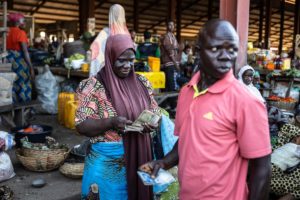
CBN said, “More consumers believe that the cost of transportation, house purchase, purchase of car/vehicle, rents and medical expenses will experience increase over the next six months in the following order.
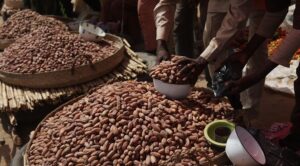
“Households anticipate spending their income on basic expenditure items like Food & Other household items, Education, Transportation, Electricity and Medical Expenses across all time periods reviewed.
“However, they do not intend to spend a substantial portion of their income on items like purchase of House, Car/vehicle for the period under review.”
The survey also indicated that households do not intend to spend their earnings on the purchase of motor vehicles and buildings & landed properties within the months under review.
“The Buying Condition Index1 for big-ticket items like Consumer Durables, Motor Vehicles and Buildings & Landed Properties, indicated that most respondents consider the current month unfavourable for purchasing these items. Consumers also do not think that the next three and six months are ideal periods to buy these items.”
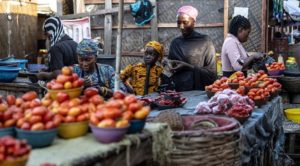
The CBN’s survey rides on the back of a similar report by AFP, that the country’s economic crisis and soaring petrol prices have forced many Nigerians to public transportation over the use of their cars.
A case study was made of Bolaji Emmanuel who gave up his driver and his Honda Pilot utility vehicle due to spiking living costs.
The price of petrol has risen more than fivefold since President Bola Tinubu took office in May 2023.
“I parked it at my son’s house. I use public transport now,” Emmanuel, a 72-year-old retired health worker, told AFP. “It is not convenient, but it is what the economy demands.”
Since coming to power, Tinubu has ended a costly fuel subsidy and freed up the naira currency, in reforms that government officials and analysts say will revive the economy and attract investors.
But in the short term, Nigeria has seen one of its worst crises in decades with inflation at a three-decade high.
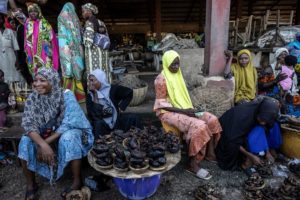
A litre of petrol sold for around 195 naira just before Tinubu took office. The price rose to at least 998 naira ($0.61) per litre in Lagos and 1,030 naira in the capital, Abuja, at the beginning of October. It can go for as much as 1,300 naira elsewhere.
Inflation reached an almost three-decade high of 34.19 per cent in June. It has since slowed to 32.7 per cent in September and October.
The slump in purchasing power is piling more hardship on locals, with more than 40 per cent of the population living in poverty, according to the World Bank. That figure is expected to rise in 2024 and 2025, before it stabilises in 2026.
Car dealers in Lagos and Abuja told AFP that they had seen more and more people trading their fuel-guzzling cars and sports utility vehicles (SUVs) for more efficient vehicles to cut costs.
“People are actually selling their big cars these days,” Maji Abubakar, a car dealer in Abuja, told AFP. “The problem is that even if you put them on the market, there isn’t much demand for them.”
“It has been more than a year since I sold a car with an eight-cylinder engine, and the major reason is the price of petrol,” he added.
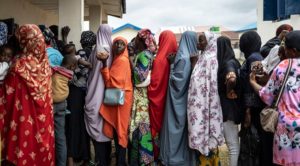
The market for new cars has dropped by 10 to 14 per cent in the last year, according Kunle Jaiyesinmi, deputy director at the Lagos-based CFAO Group, which specialises in automobile distribution.
“An SUV that sold for 40 to 45 million naira ($24,000 to $27,000) about two years ago, for now, if you want to negotiate the price, you see that it is within the range of 95 or 100 million ($57,000 to $60,000),” Jaiyesinmi told AFP.
EFCC Never Established Any Fraudulent Case Against Me – Okowa
We’ve Serviced N63bn Of Debts Incurred By Ganduje – Kano Government
The Kano State Debt Management Office has said that it serviced N63.5 billion in both foreign and domestic debts incurred during the administration of the immediate past governor, Abdullahi Umar Ganduje.
Dr. Hamisu Sadi Ali, Director General of the Kano State Debt Management Office, made this disclosure while addressing the media on the state’s debt profile.
Dr. Ali noted that the current administration, under Governor Abba Kabir Yusuf, has not incurred any new debt since coming into office on May 29, 2023.
"Since the inception of Alhaji Abba Kabir Yusuf’s NNPP administration from 29th May 2023 to date, no single penny was signed, contracted or received by the Kano State Government within or outside the country as a loan,” he affirmed.
In an effort to reduce Kano’s debt burden, the current government has paid N3.49 billion in external debt and N60 billion in domestic debt, totalling N63.5 billion for the first and second quarters of 2024. With these payments, the state’s total outstanding debt has been reduced to N127.8 billion.
Dr. Ali highlighted that the Kano State Public Debt Management Law 2021 mandates that the Debt Management Office manages all borrowing on behalf of the state government. He added that former Governor Ganduje’s administration had signed multiple international and domestic loan agreements, including a 64 million euro agreement with the French Development Agency in July 2018 for the Third National Urban Water Sector Reform Project.
The debt portfolio includes projects funded by foreign loans, such as the Multi-state Road Project, Malaria Control Booster Project, and the Third National Fadama Project. Dr. Ali clarified that, historically, Kano State had not borrowed from any domestic lenders, including commercial banks, until Ganduje’s administration, which obtained six different loans from various banks, such as a N10 billion Infrastructure Loan from Access Bank and a N20 billion Salary Bail-out from Fidelity Bank.
With this substantial debt repayment, the current administration aims to reduce Kano’s financial burden and improve the state’s economic outlook.
President Tinubu Returns To Nigeria After Arab-Islamic Summit In Riyadh
President Bola Tinubu has returned to the country after his participation in the Riyadh Joint Arab-Islamic Summit on the Middle East.
Recall that during Tinubu’s participation in the summit, President Tinubu called for an end to Israeli aggression in Gaza, warning that the conflict in Palestine has persisted for far too long, inflicting immeasurable suffering.
Addressing the extraordinary Arab-Islamic Summit, convened to address the current situation in the Middle East, President Tinubu expressed deep concern on the humanitarian conditions in Gaza.
The one-day summit was a follow-up to the Riyadh summit last year, and was attended by Heads of State and Government of the Organization of Islamic Cooperation (OIC) and the League of Arab States.











